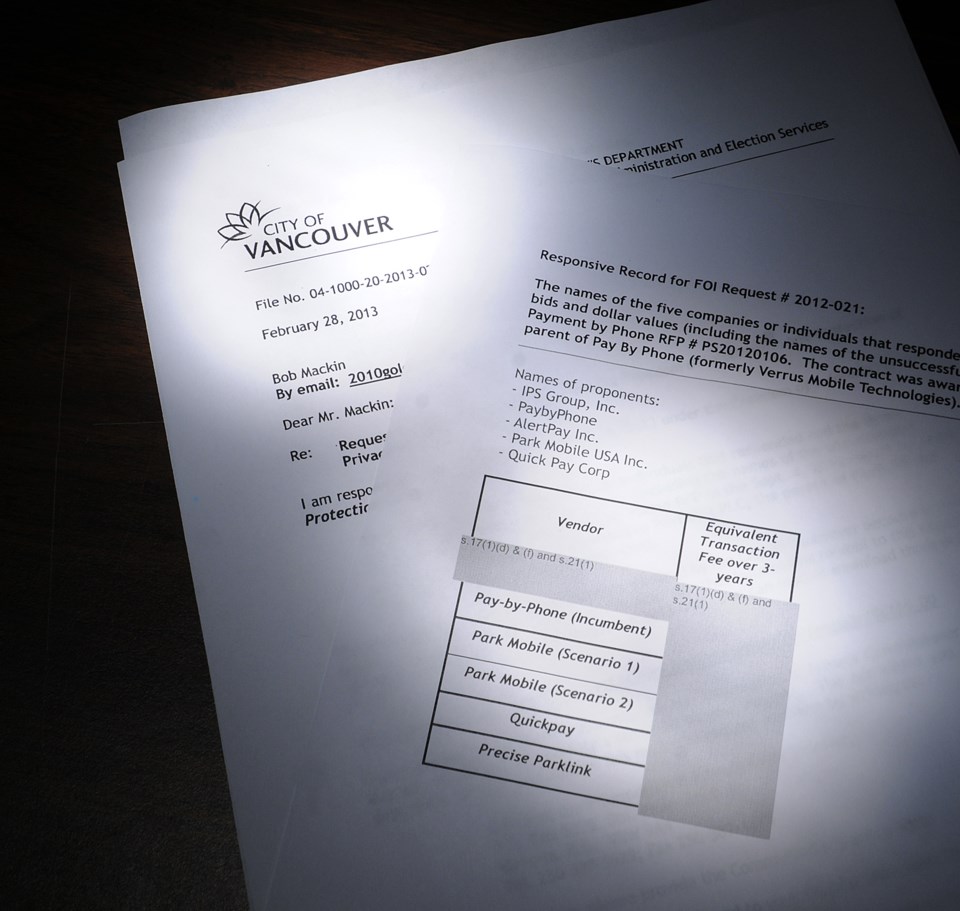In a scathing decision, the province’s Freedom of Information referee ordered the City of Vancouver to release information that it wanted to keep secret about tendering for a multimillion-dollar contract in 2012.
City hall claimed disclosure of the bidders and the dollar values of their bids for the payment by phone for parking meters contract would cause financial harm to both the city and the bidders. But Office of the Information and Privacy Commissioner adjudicator Caitlin Lemiski’s written decision said city hall provided no sworn evidence or supporting documents to justify the withholding of information from the public.
“The city has already selected a successful proponent and has awarded a contract, therefore there is no risk that disclosure will somehow harm the selection process,” Lemiski wrote in her Sept. 8 order. “In short, the city’s arguments are no more than bald assertions that are not sufficient to discharge the burden of proof that it must meet.”
Lemiski set an Oct. 21 deadline for city hall to release uncensored records.
The dispute stems from the Vision Vancouver majority city council’s unanimous rubber-stamping of a $4 million, three-year contract to incumbent PayByPhone on Sept. 18, 2012. The deal includes two, one-year options.
Transportation Director Jerry Dobrovolny’s report to city council mentioned that five companies tendered bids and three were shortlisted. However, only chosen bidder PayByPhone — a subsidiary of U.K.-headquartered PayPoint PLC — was named. The city expected to gross $45 million from parking meters in 2012, of which $10 million was expected via PayByPhone transactions.
An FOI request filed Jan. 16, 2013 sought the names of all bidders and the dollar values of their bids. When city hall responded Feb. 28, 2013, it refused to release any information.
After a complaint to the OIPC, city hall released the names of the companies on July 29, 2013, but kept the dollar values of their bids secret. That document showed the losing bidders were IPS Group Inc., AlertPay Inc., Park Mobile USA Inc. and QuickPay Corp.
Lemiski noted that city hall’s December 2013 written submissions to the OIPC inquiry did not include a copy of the tendering document or civic procurement policies and procedures. There was also no express agreement or pledge to keep bidders’ information confidential. None of the third parties filed submissions.
Lemiski’s order said city hall failed to show how disclosing the bidding information would cause any of the parties financial loss, because the contract winner was already chosen.
“In a rapidly changing era of technology, I fail to see how knowing this information could materially affect bidding three years later,” Lemiski wrote.
The OIPC order is the latest blow to city hall, which is under fire for increasing secrecy nearly six years after Mayor Gregor Robertson promised otherwise. At his December 2008 swearing-in, Robertson pledged: “I will not let you down on making city hall more open and accountable.”
Newspapers Canada’s 2014 National FOI Audit gave City of Vancouver a C overall, but an F for the slow response times.
“There is a tremendous problem in B.C. with city councils that believe they need to hide everything,” said IntegrityBC executive director Dermod Travis. “If there’s nothing to worry about, why hide it?
“Vision Vancouver has developed a reputation for being particularly secretive, and causing people to appeal [to OIPC] or go to court.”
In August, NPA mayoral candidate Kirk LaPointe pledged that his party, if elected Nov. 15, would enact a bylaw to require the routine disclosure of information to reduce citizens’ reliance on filing FOI requests to gain basic information from city hall.
twitter.com/bobmackin



